Democrats

I’ve interviewed celebrities and entertainers before, and my main complaint is always this: They tend to dodge tough topics, which then results in pretty dull conversations.
So when I got on the phone with Christian hip-hop artist Dylan Phillips, whose stage name is nobigdyl., I thought getting him to say anything interesting would be about as hard as fishing for catfish.
But I didn't have to fish long before I realized that nobigdyl. was more than willing to tackle difficult subjects.
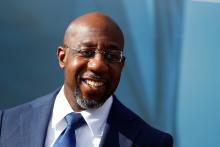
After a heated runoff election in Georgia, Rev. Dr. Raphael Warnock has won his bid for election to the United States Senate, defeating Republican incumbent Kelly Loeffler.
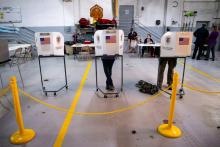
Donald Trump faced greater restraints on his presidency after Democrats won control of the House of Representatives and pledged to hold the Republicans accountable after a tumultuous two years in the White House.

The 30-second ad, which was sponsored by Trump's 2020 re-election campaign and which debuted online last week, featured courtroom video of an illegal immigrant from Mexico convicted in the 2014 killings of two police officers, juxtaposed with scenes of migrants headed through Mexico.
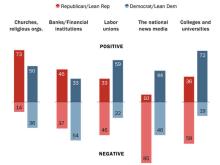
Do churches and religious organizations have a positive impact on the way things are going in the United States?
Americans are divided on that point, according to a Pew Research Center survey released on July 10 that shows they align along predictable party lines.

Political and religious leaders offered prayers for Rep. Steve Scalise and four others who were injured in a shooting during a GOP congressional baseball practice.
The Democratic team stopped their practice following the shooting on June 14 in Alexandria, Va.

Vice President Mike Pence — a onetime altar boy who became an evangelical Protestant — proclaimed President Donald Trump a faithful supporter of Catholic values at the National Catholic Prayer Breakfast, an event that sought to set aside any friction between the president and the pope.
“Let me promise all of you, this administration hears you. This president stands with you,” Pence said to the 1,300 gathered.

On Capitol Hill, we find Democrats acknowledge climate change, affirm the need for action, and sometimes even express frustration and discouragement that there has not been more action. It is as if they need more hope. On the other hand, we find Republicans continue to minimize climate change as a problem or maximize the unworkable unaffordability of a solution. Yet sometimes, off camera and behind the scenes, we encounter Republicans who fear calling for climate action due to the risk of being “primary-ed” or knocked out of an election in a primary. It is as if they need more courage.

Now a tribal coalition, which considers many sites within Bears Ears sacred, fears the Trump administration will take the unprecedented step of stripping a national monument of its designation, and leave their ancestral lands vulnerable.

Sessions has long been, in the words of one prominent immigration advocate, the “most anti-immigrant senator in the chamber.” When George W. Bush, a self-styled “compassionate conservative” and born-again Christian, pushed a comprehensive immigration reform bill in 2007 that was supported by many business and law-enforcement officials, Sessions railed against what he called the “no illegal alien left behind bill” and led the charge against the failed effort. “Good fences make good neighbors,” he said at a press conference the year before.

This election season has been an anxious time for Muslim Americans. After the election, my Facebook feed was filled with Muslim mothers wondering how to explain to their children that the new president is a man who had proposed requiring them to register with the government, and called for a ban on people of their faith coming to the United States.
As we try to absorb what this election means, we must contend with how Muslims have been cast. For the president-elect, we are either terrorists or terrorist sympathizers, who are conflated with the threat of “radical Islam.” For the most part, Democrats too see Muslim Americans through a narrow counterterrorism lens.

For the first time in three general election debates, a moderator asked the presidential candidates on Oct. 19 about abortion.
Given that abortion has rightly been described as the source of America’s second civil war, there has been a baffling lack of engagement with it this election cycle.

True, Trump has finally rallied the crucial white evangelical Christian base of the GOP to his side. But he still has outspoken detractors among prominent Christian conservatives and he is viewed with ambivalence and even deep suspicion by many Jewish and Muslim voters and members of other minority faiths.
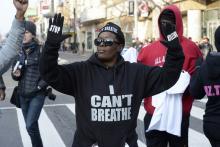
A new study from Barna paints a bleak picture of racial tension in the United States.
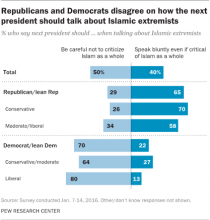
Republicans and Democrats divide sharply over views on Islam, Muslims, and how a U.S. president should label violent extremists. But Americans overall agree there’s a “a lot” of discrimination against Muslims living in the United States — and it’s rising — a new Pew Research survey finds.

t’s also one of the most divisive political issues on the Hill right now. Here’s why: The notion of "fast tracking" trade deals with almost no congressional oversight has led to the creation of odd alliances — putting the Democrats and Tea Party in one camp (against), and the Republicans and Obama Administration (for) in another. Pro-business Republicans are long time supporters of free trade, while members of the Tea Party are against most anything that would allow the President to usurp legislative authority. As for Democrats, they argue that the TPP would allow multinational corporations to undermine labor safeguards, civil rights, environmental protection and healthcare, and derail urgent efforts at fighting climate change. Organizations typically aligned with President Obama are against him here: labor unions, environmental groups, and even traditionally non-political groups have fought hard against Fast Track and the TPP.
Indeed, the potential harm from the trade deal seems to leave few interest groups untouched. To provide just a few examples, Doctors Without Borders has called the TPP the "worst trade deal ever," claiming that it will cause millions to lose access to life-saving medicines; left-leaning Global Exchange has pointed to the increasing number of sweatshops such a framework would lead to; and the digital rights organization Electronic Frontier Foundation has expressed its belief that the TPP would put overly restrictive controls on the internet. And we’ve already seen our political leaders weaken standards for protection against human trafficking and child labor should the trade deal move forward.
These are all compelling arguments, and they are ones faith groups are making as well.
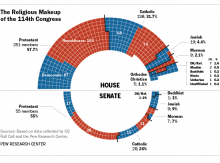
Republicans will take full control of Capitol Hill when the 114th Congress is sworn in on Jan. 6, but even with a political shift, there will be little change in the overall religious makeup of Congress, according to a new analysis from the Pew Research Center.
Here are seven ways the religious makeup of Congress will (and won’t) change.
1) More than nine-in-10 members of the House and Senate (92 precent) are Christian; about 57 percent are Protestant while 31 percent are Catholic. The new Congress will include at least seven members who are ordained ministers.
2) Protestants and Catholics continue to be over-represented as members of Congress than other Americans. As of 2013, 49 percent of American adults are Protestant, and 22 percent are Catholic, according to a new Pew Research Center analysis.
3) The biggest difference between Congress and other Americans is the number of people who say they are religiously unaffiliated. Just 0.2 percent of Congress say they are religiously unaffiliated, compared with 20 percent of the general public. In fact, the only member of Congress who publicly identifies herself as religiously unaffiliated is sophomore Rep. Kyrsten Sinema, D-Ariz.
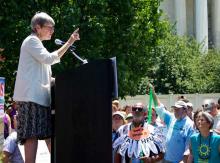
This time it’s the Catholic sisters versus the Koch brothers.
That’s one way to look at the upcoming “Nuns on the Bus” tour, which hits the road Sept. 17 for the third time in three years, a monthlong trip though 10 key U.S. Senate battleground states to campaign against the influence of outside money on politics.
The issue has come to be identified with the wealthy industrialist brothers Charles and David Koch, whose huge contributions to conservative political causes have raised concerns about the role of “dark money” on elections.
The spigot for such undisclosed donations, which can be made by unions as well as corporations, was opened by the controversial 2010 Citizens United Supreme Court decision. That was followed by another 5-4 ruling in April of this year, McCutcheon v. Federal Election Commission.
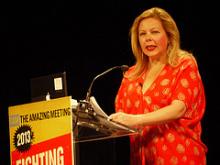
As the Secular Coalition for America prepares for its biggest event of the year this week in Washington, D.C., atheist groups are recovering from the sudden departure of the coalition’s highest officer and confronting renewed charges that nonbelief groups have a shortage of women leaders and are suspicious of conservatives.
The story was first reported by The New York Times and referred to a leaked internal audit.
The SCA said Rogers, who was hired about two years ago, was in no way connected to the missing funds. She dismissed the two employees allegedly responsible and reported the matter to the police and the organization’s board.

I’ve recently been thinking a lot about failure.
Not my failures, though I suspect we could come up with a few.
No, I’ve thinking about Scott Walker’s failed governorship in Wisconsin.
And Barack Obama’s failed presidency in the nation.
And our failed foreign policy.
And the failed Affordable Care Act.
And Walker’s failed jobs policy for the Badger State. And so on.
Then I started thinking about the failure of our political dialogue these days.